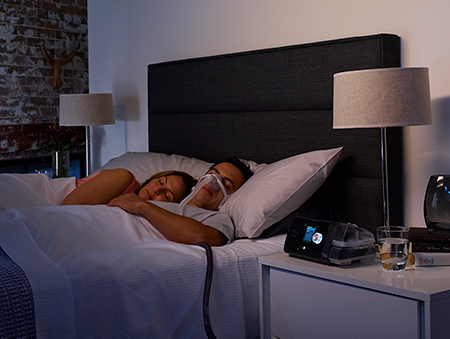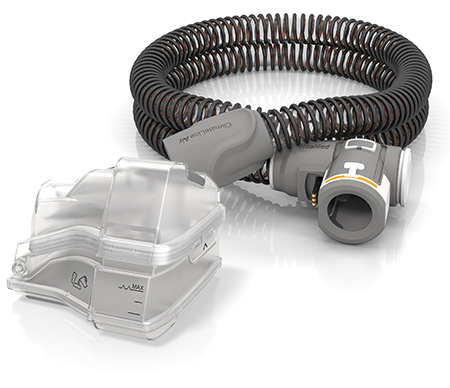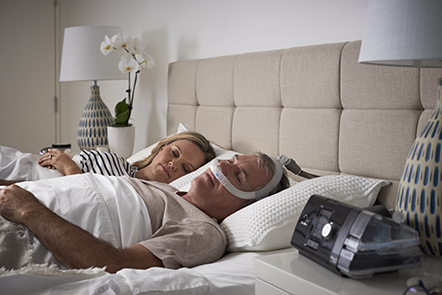7 Tips for Sleeping with CPAP
Author: mySleep Date Posted:20 September 2021

Treating Sleep Apnea can be life changing, it not only improves your sleep, but it can improve your energy levels and enable you to have better health and wellbeing. Some people find it very easy to get used to CPAP therapy, but don't worry if it takes you a little bit longer. Everybody is different.
Learning to use your CPAP equipment is about forming good habits, staying positive, practice and perseverance. It's also about getting comfortable with your new equipment. Here are some tips to help gently ease you into therapy and a better night’s sleep.
 1. Ease yourself into CPAP
1. Ease yourself into CPAP
Try using your CPAP equipment for a few short periods during the day. Wearing it when you’re not tired, like when you’re watching TV or reading, is a great way to get used to it and work out if any adjustments are needed.
Your mySleep Consultant will have already set up your equipment's to suit your treatment requirements, but you may have to make some subtle adjustments to your mask or humidifier settings yourself.
 2. Making your CPAP Mask comfortable
2. Making your CPAP Mask comfortable
The most common problems with treatment occur when your CPAP mask doesn’t fit properly, and you may not be able to go to sleep as easily as you should.
Try putting your mask on during the day. Make subtle adjustments to it to get a good seal and to make it comfortable. Stand in front of a mirror so you can see what you’re doing.
Once you’ve made some adjustments to how it feels, try lying down and turning on your machine. Your face contour will change slightly when you lay down. So, this is an important step not to miss! Your CPAP machine may have a ‘Mask Testing Mode’ that you can then use to test it with.
If the mask is too big, the headgear straps holding it to your face will need to be pulled tightly and this may irritate you. And if the mask is too small, it may not seal properly, and the air may blow into your eyes. If you find that you are having either of these problems, speak to your mySleep Consultant as you may need a mask re-fitting.
 3. Use the Ramp setting on your CPAP machine
3. Use the Ramp setting on your CPAP machine
When you’ve made your way to bed and fitted your mask, start up your machine. If the air pressure from your machine feels too high while you’re trying to fall asleep, use the ‘ramp mode’ to help you fall asleep at a lower pressure.
Some machines, have a smart automatic ramp pressure setting. This means the machine won't increase the pressure until you’ve fallen asleep. So, check what type of machine you have and either adjust your settings, or speak to your mySleep Consultant about increasing the ramp time.

 4. Using Humidification
4. Using Humidification
Waking up with a dry mouth, scratchy throat or a stuffy nose from your CPAP can be unpleasant and discouraging and these symptoms may indicate you need humidification, or your current humidifier is not set correctly.
Adding humidification to your CPAP machine is one of the best ways to increase treatment usage and comfort.
Most modern CPAP machines come with a built-in humidifier and a heated tubing option designed to maintain the temperature of the air as it passes from the humidifier through the tube for a more comfortable experience.
If you are experiencing any discomfort or you if you have noticed your treatment has become less effective, adjusting the humidifier and/or tube temperature can help get your therapy back on track.
 5. Maintaining Good Sleep Hygiene
5. Maintaining Good Sleep Hygiene
To help assist you getting used to CPAP therapy, make sure you’re doing your best to maintain good Sleep Hygiene. What is Sleep Hygiene? It means making sure your lifestyle, habits and practices are all conducive to helping you sleep well on a regular basis.
You can improve your sleep hygiene by making a few minor adjustments to your lifestyle. Here are some handy sleep hygiene tips(1):
Do:
- Set a routine for going to bed and waking up. This helps to set up a natural rhythm for your body.
- Get your daily Vitamin D intake. Vitamin D promotes melatonin which helps you sleep.
- Have a comfortable sleeping environment. Is your room cool, dark, and quiet?
- Your bed should be for sleep, it needs to be associated in your mind as the place you go for sleep – not to watch TV or work.
- Make sure you give your body time to relax each night before bed.
Don't:
- Drink caffeinated drinks before bed, caffeine is a stimulant and may keep you awake. Caffeine can also be found in coffee, tea, chocolate, and soft drinks.
- Exercise also acts as a stimulant; therefore, it can prevent you from falling asleep. Exercise should take place at least 2 hours prior to bed.
- Another stimulant is nicotine, which can also make it hard for you to fall asleep.
- Alcohol is a muscle relaxant and may worsen snoring or a sleep disorder such as sleep apnea.
- Eat heavy, spicy, or sugary meal or going to bed hungry may promote a restless night.
(1) Eric J, Olsen, M.D. How many hours of sleep are enough for goof health, Mayo Clinic, 2016.
Making small improvements to your sleep hygiene may help set you up for success with your CPAP therapy.
 6. Don't go to bed until you feel tired
6. Don't go to bed until you feel tired
When starting on CPAP you should try to go to bed only when you feel tired. Don't do this too often though, only do it as you’re getting used to CPAP therapy.
If you head off to bed when you aren't feeling tired, you may not be able to switch off. And when you add in the addition of something new and unfamiliar like a CPAP machine, and you might find it unusually hard to fall asleep. Your mind may keep you awake by thinking too much about your mask and machine.
If you find when it’s getting close to bedtime that you aren't tired, consider delaying going to bed by a little while. Try doing something relaxing.
 7. Be relaxed when you go to bed
7. Be relaxed when you go to bed
A busy, racing, or worried mind will find it hard to go to sleep straight away. Add in your CPAP machine and mask to the mix, and you might start thinking it's going to be impossible to go to sleep.
But don't stress. Do a few things that you find relaxing 1-2 hours before bed. We’re all different, so do whatever works best for you!
For example:
- Take a bath (the rise, then fall in body temperature can promote drowsiness)
- Read a book
- Listen to music
- Practice relaxation exercises, meditation, or yoga
Avoid stressful or stimulating activities like doing work, watching TV, using iPhones, or discussing emotional issues. These things can cause your body to pump out the stress hormone, cortisol, which can increase your alertness. If you tend to take your problems to bed, try writing them down‚ and then put them aside.


CPAP Treatment can be life changing,
it improves your Sleep, Health and Wellbeing.
Remember, just be kind and patient with yourself as you’re getting comfortable using a CPAP equipment each night . Doing all the above steps will give you a good chance of being successful on CPAP.
Always keep in mind that using CPAP brings with it many health benefits, more energy during the day and better concentration to do the things you love.
And if it’s just not working for you, reach out to one of the friendly mySleep team to discuss your CPAP therapy on 1300 605 700 or contact us









